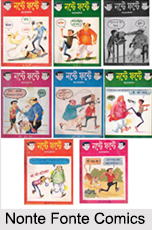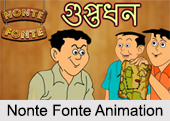 Nonte Fonte is amongst the most popular characters in Indian comics series that is published and distributed by Kishore Bharati in a monthly basis. The two characters were originally created by Narayan Debnath as a Bengali comic strip but due to the positive response from the readers, it was later transformed into a series and was released as a monthly magazine. The series features various short stories that revolve around the two central characters, Nonte and Fonte, and their trivial lives.
Nonte Fonte is amongst the most popular characters in Indian comics series that is published and distributed by Kishore Bharati in a monthly basis. The two characters were originally created by Narayan Debnath as a Bengali comic strip but due to the positive response from the readers, it was later transformed into a series and was released as a monthly magazine. The series features various short stories that revolve around the two central characters, Nonte and Fonte, and their trivial lives.
Other important characters in this Indian comics series include Keltuda, a school-senior, and their Hostel Superintendent. Nonte Fonte comics have also been published in book form and have been reconstructed and reprinted in colour since the year 2003. An animation series based on the characters from the Nonte Fonte has also been created and are aired in regional television channels.
Characters of Nonte Fonte
The story of Nonte Fonte is based in an unnamed semi-rural town in the state of West Bengal. Nonte and Fonte, along with their friends, live in a hostel of a boarding school. The Hostel Superintendent is a strict teacher who often punishes them for the nuisances caused by Keltuda. All of the characters are identified with funny nicknames that add to the overall appeal of the series.
Some of the major characters in the Nonte Fonte series are discussed below-
Nonte
Nonte, one of the lead characters, is a 16 year old teenage boy who is always identified immediately because of his orange shirt. Although the appearance and mannerisms of Nonte and Fonte are almost similar, but Nonte is distinguishable due to his comparatively longer hair and a tuft of hair that sticks out from the back of his head.
Fonte
Fonte, the second lead character in the series, is a 15 year old teenager who usually wears a blue shirt and has short crew-cut hair. Apart from having similar looks with Nonte, the two main characters are also similar in terms of character development. Although they are not related to each other, both Nonte and Fonte seem to think alike.
 Keltuda
Keltuda
Keltuda is a 19 year old school senior and a bully who bothers Nonte Fonte all the time. He has a tall build, curly hair and a stubby nose and is very greedy by nature. Keltuda also has tendencies of lying and stealing. He is the only student who wears full length trousers instead of shorts. It has also been portrayed that Keltuda has failed a class for 6 times repeatedly and thus the governing body of the school wants to remove him from the institution. Keltuda often bullies, coaxes and threatens Nonte Fonte into working for him but at the climax he gets busted himself. It is also depicted that the Superintendent often favours him and considers him as one of the good pupils but often insults and beats him as well for his idiotic activities.
Hostel Superintendent (Sir)
The Hostel Superintendent is a 50 year old obese balding man who enjoys punishing his students and eating all the time. He is often portrayed as greedy, lazy and somewhat cowardly. Usually he is the target of most pranks and is always interrupted by his students. In the comic books his name is mentioned as Patiram Hati. But, in the animated cartoon series, his name is mentioned as Hatiram Pati.
Thakur
Thakur is a 42 year old man, who is servant of the Superintendent and hates Nonte and Fonte. He cannot speak fluent Bengali and hence uses quotes from Hindi, Marathi, Gujarati and Punjabi languages. He refers to his master as Babua and calls Nonte and Fonte as Nantua and Fantua respectively.
There are some other recurring characters as well like the headmaster of the school, the chefs at the boarding school hostel, and other fellow students such as Boncha, Lengcha and Nepchada.
Concept of Nonte Fonte
Most of the major characters in the series are very fond of eating a good hearty meal and many plotlines are constructed around the complications that arise from attempting to steal food from one another and grab some goodies. The hostel superintendent is portrayed as a lazy, despicable and corrupt person who loves to discipline and beat the students according to his whims. But most of the times he is tricked by Keltuda and also deceived by Nonte Fonte in the climax of the story. It is a recurring feature to show Keltuda getting thrashed by the superintendent at the last panel of the stories.
Nonte and Fonte also perform many social services for the community and in several instances end up catching bad guys in disguises. Keltuda is usually quite malicious towards Nonte and Fonte and even succeeds in getting the duo in trouble but in some stories the lead protagonists team up with Keltuda and perform good deeds. Keltuda usually comes off to be this clever individual but in each story his cleverness is invariably revealed as being foolhardiness.
The earlier editions of Nonte Fonte were reminiscent to that of the Handa Bhonda comic strips. Initially Nonte and Fonte did not used to get along well with each other. This often led to fights and this tension between the two is somewhat akin to the Handa Bhonda comics, where the duo"s fights leads to doing some good to the bystander under amusing circumstances. It is said that some of the Nonte Fonte comics are recycled into Handa Bhonda comic strips featuring Bhonda`s friend Bocha, with Keltu, Nonte and Fonte being replaced with Handa, Bocha & Bhonda respectively.
Television Adaptation of Nonte Fonte
The Nonte Fonte series were made into an original animated television series that were initially broadcasted on Tara Television Channel and later in CTVN Channel. Esteemed Bengali film and television actor, Kanchan Mullick"s portrayal of Keltuda was admired and lauded by the audience but the series however discontinued due to poor production values and low TRP"s.



















